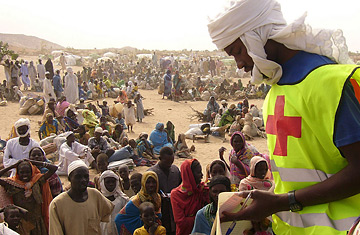
An aid worker assists refugees from Darfur.
Three years ago, the dusty general stores lining El Fasher's market sold dates, spices and sacks of maize flour. Cornflakes were a rarity. Yet, today the cool interior of Mohamed Osman Babkir's shop is packed with bottles of Spanish olive oil, balsamic vinegar and jars of preserved cherries. "People don't expect to find these things here," he says. "But there are people making money here, not just refugees."
While more than 150,000 people live in squalid, sprawling camps around north Darfur's main town, shopkeepers are cashing in on the influx of aid workers with money to spend. A six-story shopping mall and office block is under construction next door to Babkir's store, and scores of tiny Korean taxis dodge donkey carts in El Fasher's sand-covered streets. Other shops sell jars of the powdered milk drink Ovaltine, and tubs of Camembert cheese bearing made-in-France labels. "There's high demand ever since the African Union and the aid agencies came here," says Babkir, whose prices rise when the rainy season turns the roads leading here from Khartoum into quagmires.
Sudan's troubled western region of Darfur is the world's largest humanitarian operation, with some 12,000 aid workers having been deployed here since rebels took up arms against the government more than four years ago. An estimated 200,000 people have died after Khartoum mobilized the Arab militias known as Janjaweed against villages believed to be supporting the uprising. Since then, the rebels and militias have fragmented and turned on one another. But the humanitarian agony continues for civilians prone to Janjaweed attack and for the 2.5 million people who have fled in fear for their lives and now make do in cramped huts built from sticks and straw in aid camps like the three arranged around the edge of El Fasher. An African Union (AU) force of 7,000 soldiers, police officers and cease-fire monitors has failed to stop the violence, but they've been good business for local merchants. The peacekeepers, after all, have cash to spend, as do the United Nations staffers, some of whom are paid daily allowances of more than $160.
Abduljabbar Abdellah Fadul, an economist who runs a consultancy from his simple office at El Fasher University, says the town is in the grip of a construction boom driven by the demand for housing. Locals have rented their homes to the new arrivals, and are building new ones. "Plots out here," he says waving at the land beyond the university close to the African Union base, "were just left empty. They were worth maybe $1,000 three or four years ago. Now the same ones are being bought for $15,000." All the retail space has been rented out in the new office block, which will become Darfur's tallest building on its completion.
While there's little sign of an end to the ordeal of the those in the camps, for the entrepreneurs of El Fasher, things look likely to get even better: At the end of 2007, the struggling AU mission will be merged into a 26,000-strong hybrid U.N. operation. Already, new houses are springing up close to the razor-wire fence of the AU headquarters, where simple four-bedroom houses can fetch $2,000 a month. Tajel al-Din Dissa, an economics lecturer at the university, is among those investing in property. He rents one house to an AU officer and is building a second, which he hopes will push his rental earnings above his university salary. But he has mixed feelings about the overall impact of the boom on Darfur. "The per capita income has increased because many people are finding work with the [aid organizations] and the African Union or the United Nations, and then there is a knock-on effect of more purchases in the market," he says, sitting on the mud-brick wall around the land where his new house will rise. "But in the field of peace nothing has improved."
